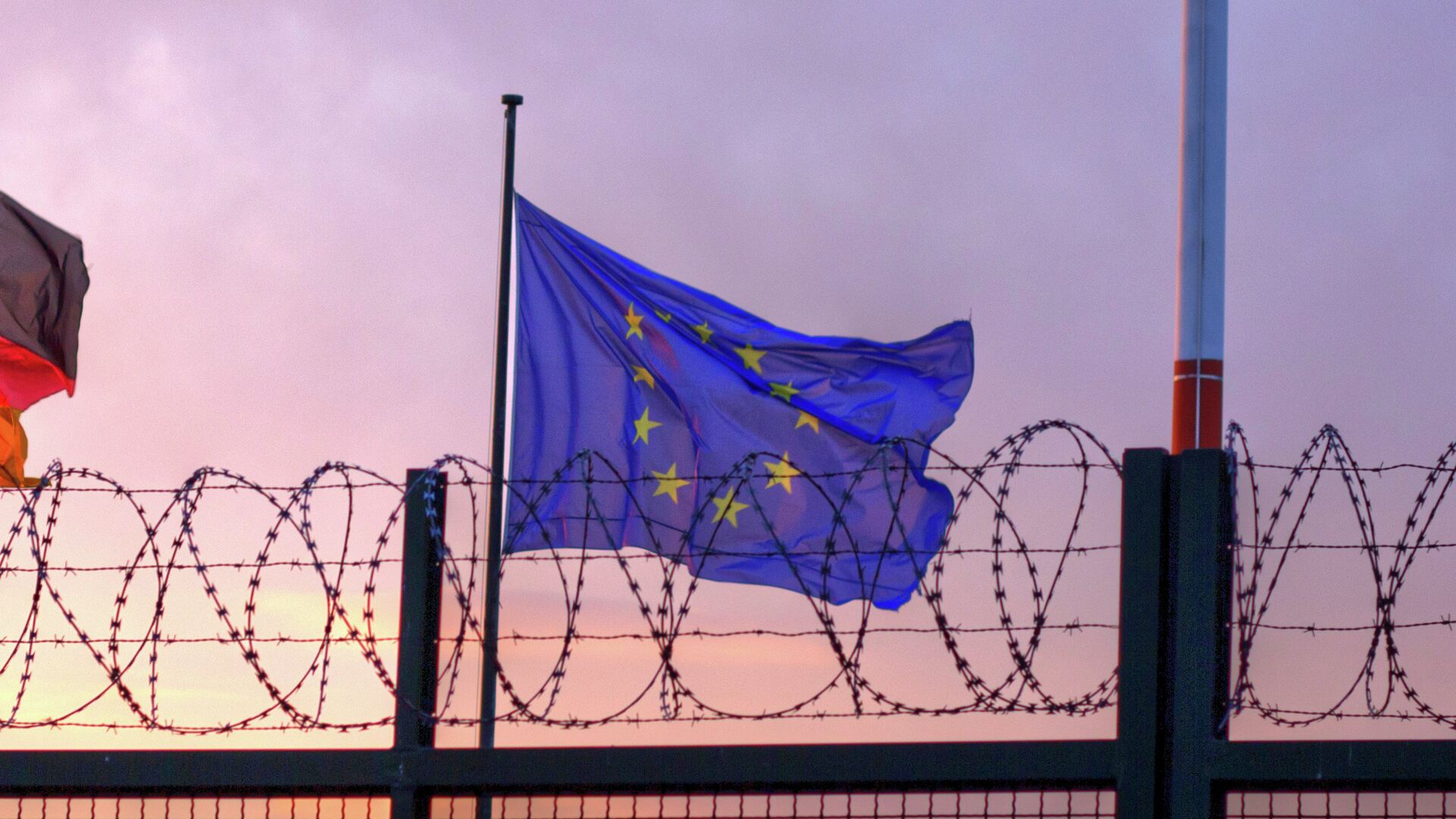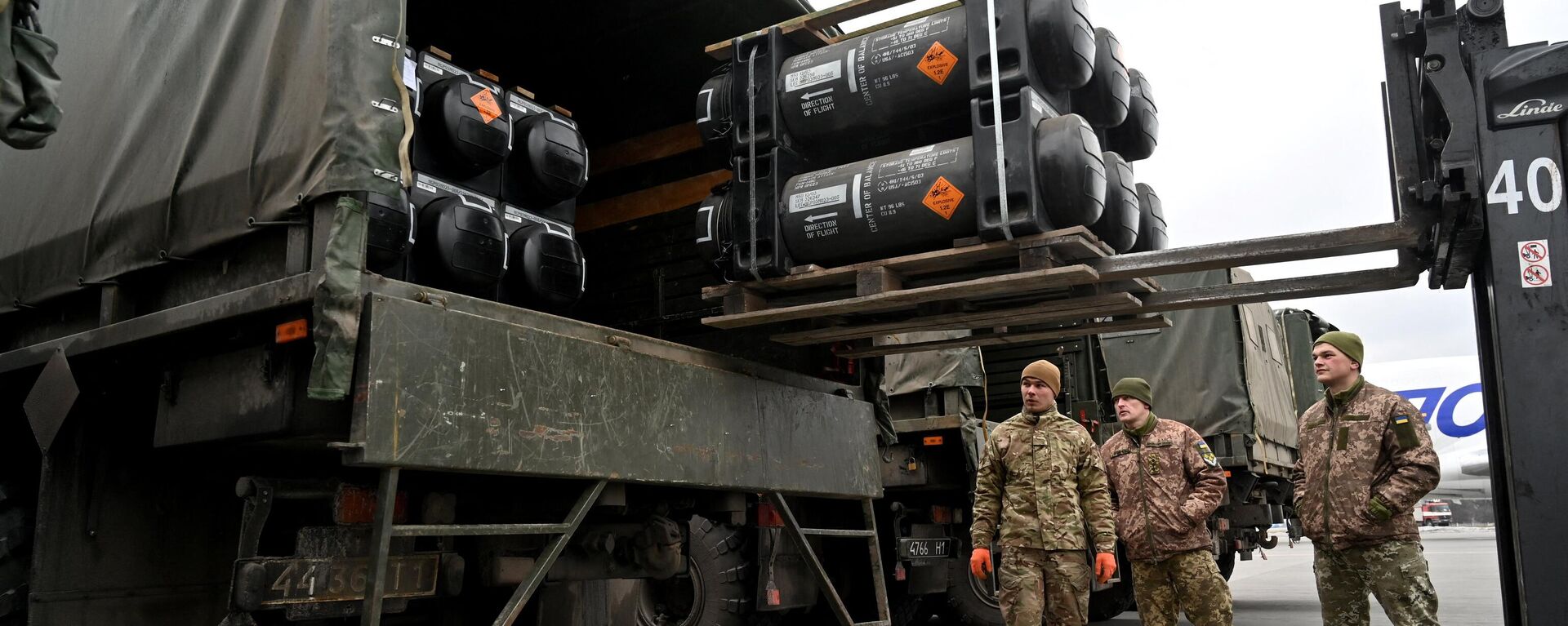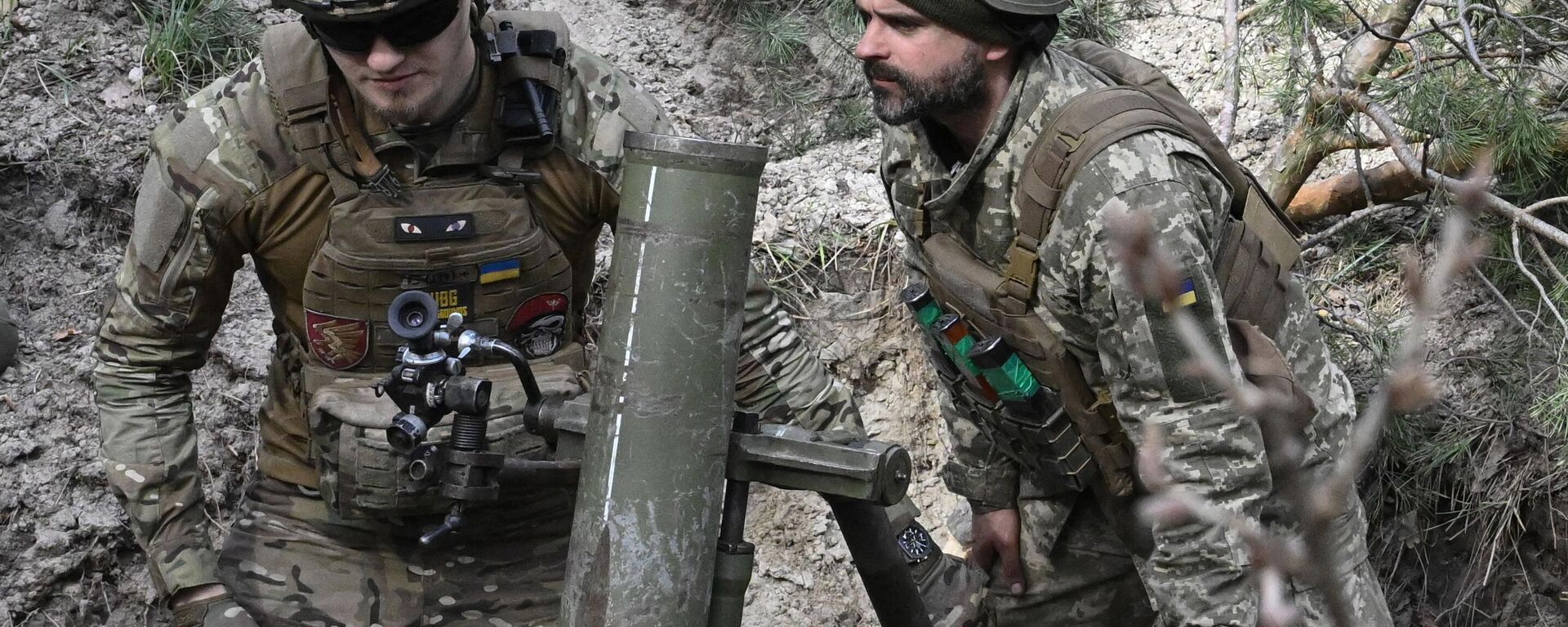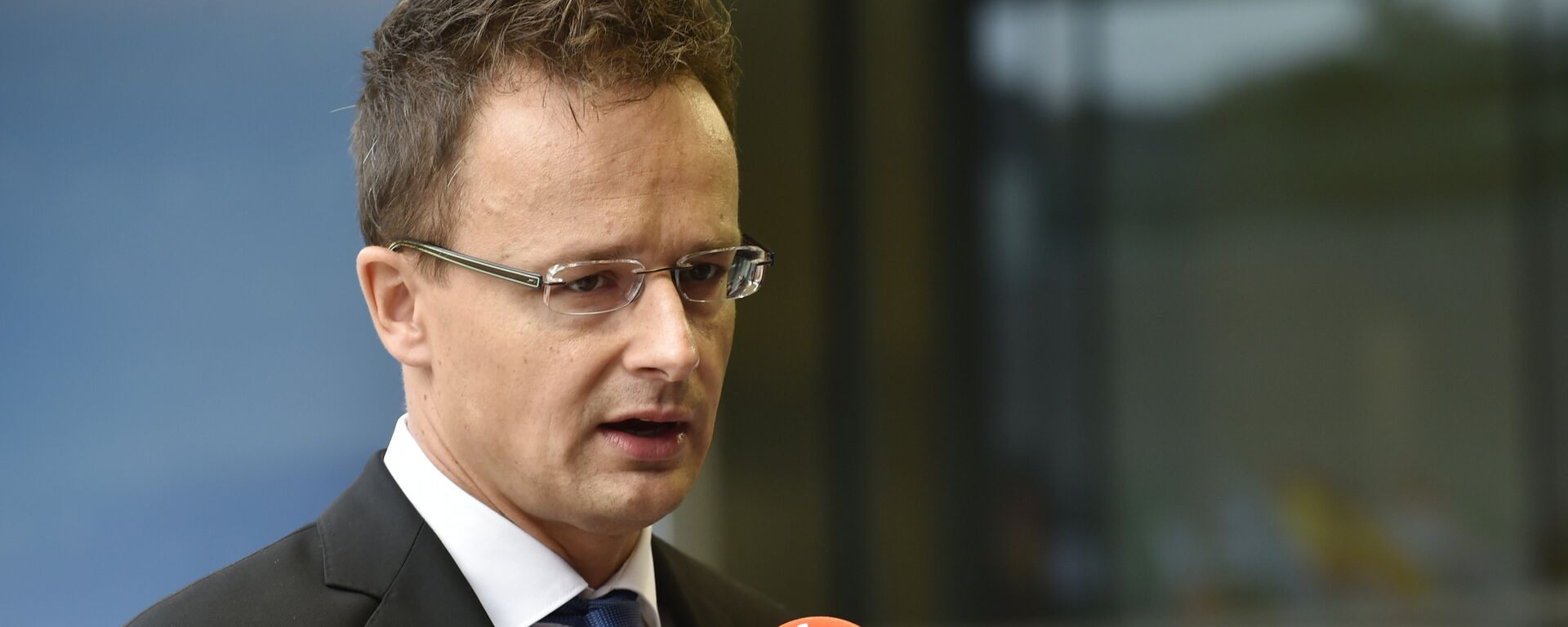https://sputnikglobe.com/20230523/hungary-and-germany-quarrel-over-blocked-ukraine-military-aid---reports-1110535502.html
Hungary and Germany Quarrel Over Blocked Ukraine Military Aid - Reports
Hungary and Germany Quarrel Over Blocked Ukraine Military Aid - Reports
Sputnik International
Foreign Ministers of Germany and Hungary quarreled during a closed-door gathering in Brussels over the role of Hungary’s OTP Bank in the Ukraine conflict, a report stated.
2023-05-23T11:28+0000
2023-05-23T11:28+0000
2023-05-23T11:28+0000
world
germany
hungary
ukraine
ukraine crisis
péter szijjártó
annalena baerbock
viktor orban
https://cdn1.img.sputnikglobe.com/img/102127/34/1021273437_0:0:2653:1492_1920x0_80_0_0_505bea40f885c480eba8feef57d60ebc.jpg
Germany and Hungary exchanged some verbal broadsides during a closed-door foreign ministers’ gathering in Brussels, a US media report stated.Specifically, the exchange was triggered by the role of the OTP Bank (the National Savings and Commercial Bank of Hungary) in the Ukraine conflict, according to cited unnamed diplomats. Hungary, which has been opposing Europe's arms supplies to the Kiev regime for prolonging the conflict, has refused to approve more EU military aid for Ukraine.As Peter Szijjarto reiterated Budapest’s stance on the issue, his German counterpart, Foreign Minister Annalena Baerbock, is described as referencing a spate of unspecified reports. These accused OTP of "recognizing" the Lugansk and Donetsk People’s Republics.The Hungarian bank was also accused of extending credit lines to Russian soldiers.Peter Szijjarto is said to have rejected the accusations targeting the OTP bank, citing a statement released by the company which claimed the reports were “not correct."According to those attending the gathering, the exchange was “civilized and in a normal framework of the discussion.” However, this is said to have followed attempts by Sweden and Estonia at the same meeting to pressure Hungary to stop "stalling" over more sanctions against Russia.Sanctions 'Contrary to Common Sense'Earlier, Budapest blocked the release of the eighth tranche of EU military aid to Ukraine worth 500 million euros ($543 million) via the European Peace Facility (EPF), Brussels sources were cited as saying. Hungary allegedly demanded guarantees that the EPF maintain its "global" vision in the future and not be used exclusively for arming Kiev.Furthermore, one of the issues currently brought up by some European states is Ukraine's list of private companies it has branded "war sponsors." Among these is Hungary’s OTP Bank. The Hungarian government will not grant its approval to the next tranche of the European Peace Facility to Ukraine unless Hungary's OTP Bank is removed from this list, Peter Szijjarto stated after a meeting with Alexander Schallenberg, his Austrian counterpart, on Monday.Peter Szijjarto was also quoted as denouncing the EU’s planned 11th package of sanctions as “fully contrary to common sense.” Underscoring that the previous 10 had failed, he reportedly also voiced concern about mulled EU measures targeting eight Chinese companies which could “certainly aggravate or even thwart” ties with China.Last month, at an EU Foreign Affairs Council meeting in Luxembourg Peter Szijjarto yet again warned that delivery of military aid to Kiev only draws out the conflagration. Hungarian Prime Minister Viktor Orban has repeatedly lambasted arms manufacturers, raking in massive profits, and Western economic circles who hope to lay their hands on Russia's rich natural resources as the ones interested in seeing the Ukraine conflict rage on.European countries have rustled up 10 sanctions packages against Russia since Moscow launched its special military operation in Ukraine. They have also threatened to impose secondary sanctions on countries allegedly helping Moscow evade restrictions. Earlier in May, European Commission President Ursula von der Leyen unveiled an 11th package of sanctions cobbled together by the European Commission. Besides aiming to add more products to the EU transit ban, it was proposed to combat sanctions circumvention, targeting "shadow" entities.However, not only have these restrictions become self-harming, backfiring on those who introduced them, they have failed to "cripple" Russia's economy, as the Western supporters of the proxy war against Moscow in Ukraine had hoped. As for weapons deliveries to Kiev, Russia's Foreign Minister Sergey Lavrov has said any cargo that contains weapons for Ukraine will become a legitimate target for Russia.
https://sputnikglobe.com/20230515/hungary-blocks-540mln-tranche-of-military-aid-to-ukraine---reports-1110394661.html
https://sputnikglobe.com/20230505/hungarys-orban-ukraine-crisis-is-klondike-for-arms-makers--profiteers-1110118968.html
https://sputnikglobe.com/20230424/hungarys-szijjarto-says-arms-supplies-to-kiev-only-prolong-ukraine-conflict-1109797781.html
germany
hungary
ukraine
Sputnik International
feedback@sputniknews.com
+74956456601
MIA „Rossiya Segodnya“
2023
News
en_EN
Sputnik International
feedback@sputniknews.com
+74956456601
MIA „Rossiya Segodnya“
Sputnik International
feedback@sputniknews.com
+74956456601
MIA „Rossiya Segodnya“
foreign ministers of germany and hungary, spat, quarrel, closed-door gathering, brussels, hungary’s otp bank, ukraine conflict, lugansk and donetsk people’s republics, anti-russia sanctions, self-harming anti-russia sanctions
foreign ministers of germany and hungary, spat, quarrel, closed-door gathering, brussels, hungary’s otp bank, ukraine conflict, lugansk and donetsk people’s republics, anti-russia sanctions, self-harming anti-russia sanctions
Hungary and Germany Quarrel Over Blocked Ukraine Military Aid - Reports
Budapest has vehemently opposed Europe's arms supplies to Kiev, with Prime Minister Viktor Orban cautioning the European Union in February that it could sleepwalk into an armed conflict with Russia by sending increasingly deadly weapons to Ukraine.
Germany and Hungary exchanged some verbal broadsides during a closed-door foreign ministers’ gathering in Brussels, a US media report stated.
Specifically, the exchange was triggered by the role of
the OTP Bank (the National Savings and Commercial Bank of Hungary) in the Ukraine conflict, according to cited unnamed diplomats. Hungary, which has been opposing
Europe's arms supplies to the Kiev regime for prolonging the conflict, has refused to approve more EU military aid for Ukraine.
As Peter Szijjarto reiterated Budapest’s stance on the issue, his German counterpart, Foreign Minister
Annalena Baerbock, is described as referencing a spate of unspecified reports. These accused OTP of "recognizing" the
Lugansk and Donetsk People’s Republics.
On September 30, 2022, Russian President Vladimir Putin and the heads of the Donetsk and Lugansk People's Republics, as well as the Kherson and Zaporozhye regions, signed agreements on the accession of these territories to Russia, after referendums were held that showed that an overwhelming majority of the local population supported becoming part of Russia.
The Hungarian bank was also accused of extending credit lines to Russian soldiers.
Peter Szijjarto is said to have rejected the accusations targeting the OTP bank, citing a statement released by the company which claimed the reports were “not correct."
According to those attending the gathering, the exchange was “civilized and in a normal framework of the discussion.” However, this is said to have followed attempts by Sweden and Estonia at the same meeting to pressure Hungary to stop "stalling" over more sanctions against Russia.
Sanctions 'Contrary to Common Sense'
Earlier, Budapest
blocked the release of the eighth tranche of EU military aid to Ukraine worth 500 million euros ($543 million) via the European Peace Facility (EPF), Brussels sources were cited as saying. Hungary allegedly demanded guarantees that the EPF maintain its "global" vision in the future and not be used exclusively for arming Kiev.
The EPF, set up in March 2021 under the Common Foreign and Security Policy to bolster the EU's role as a global security provider, declares its goals as maintenance of peace and the prevention of conflicts. However, last year, EU member states agreed to use the EPF to fund some of the military supplies to Ukraine.
Furthermore, one of the issues currently brought up by some European states is Ukraine's list of private companies it has branded "war sponsors." Among these is Hungary’s OTP Bank. The Hungarian government will not grant its approval to the next tranche of the European Peace Facility to Ukraine unless Hungary's OTP Bank is removed from this list, Peter Szijjarto stated after a meeting with Alexander Schallenberg, his Austrian counterpart, on Monday.
"Further, serious proposals have been tabled in Brussels, expecting European people to take further sacrifices while they would not bring peace a centimeter closer", he said, according to a cited Foreign Ministry statement.
Peter Szijjarto was also quoted as denouncing the EU’s planned 11th package of sanctions as “fully contrary to common sense.” Underscoring that the previous 10 had failed, he reportedly also voiced concern about mulled EU measures targeting eight Chinese companies which could “certainly aggravate or even thwart” ties with China.
Last month, at an EU Foreign Affairs Council meeting in Luxembourg Peter Szijjarto yet again warned that delivery of military aid to Kiev only draws out the conflagration. Hungarian Prime Minister
Viktor Orban has repeatedly lambasted arms manufacturers, raking in massive profits, and Western economic circles who hope to lay their hands on Russia's rich natural resources as the ones interested in seeing the
Ukraine conflict rage on.
European countries have rustled up 10
sanctions packages against Russia since Moscow launched its special military operation in Ukraine. They have also threatened to impose secondary sanctions on countries allegedly helping Moscow evade restrictions. Earlier in May, European Commission President Ursula von der Leyen unveiled an 11th package of sanctions cobbled together by the European Commission. Besides aiming to add more products to the EU transit ban, it was proposed to combat sanctions circumvention, targeting "shadow" entities.
However, not only have these restrictions become self-harming, backfiring on those who introduced them, they have failed to "cripple" Russia's economy, as the Western supporters of the proxy war against Moscow in Ukraine had hoped.
As for weapons deliveries to Kiev, Russia's Foreign Minister Sergey Lavrov has said any cargo that contains weapons for Ukraine will become a legitimate target for Russia.





